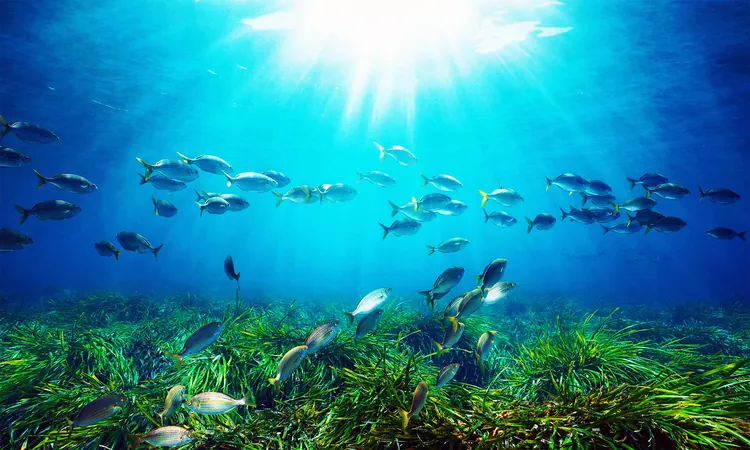
The Shocking Impact of Nighttime Light Pollution on Fish Behavior and Offspring!
2024-09-24
Fish Feeling the Stress of Anxiety
A group of researchers from the Institute of Hydrobiology at the Chinese Academy of Sciences and the Max Planck Institute for Animal Behavior, spearheaded by Wei Wei Li, explored how ALAN affects zebrafish behavior. Their findings are shocking: constant exposure to artificial light led to noticeable anxiety-like behaviors in zebrafish. These fish began swimming less, lingering near the tank walls, and clustering together more tightly—changes that would trigger concern in any observer.
Out of all the wavelengths tested, blue light had the most profound and immediate effects, sparking a wave of anxiety in the fish. Imagine if your late-night binge-watching sessions did more than just ruin your sleep; they could alter the way living beings interact and thrive!
The Hidden Dangers of Light Pollution
Wei Wei Li emphasizes that the repercussions of ALAN don’t end with adults; they extend to future generations. The illumination levels utilized during the study mirrored the light that currently floods animal habitats at night. This raises a critical question: if human life is being disrupted by our own creations, what is the cost for wildlife?
“Sleep plays a crucial role in an animal's ability to navigate its environment effectively. We were keen to examine how disrupted sleep cycles might affect their behavior and interactions,” explains Li. His concerns are warranted: the findings revealed stark behavioral alterations after only a handful of bright nights.
Waves of Blue Light: A Threat to Offspring
The research team set out to investigate the varying impacts of different wavelengths on zebrafish, ultimately finding that blue light brought about detrimental changes more swiftly than other colors. After just five nights of exposure to blue light, the zebrafish exhibited severe behavioral changes.
“The quick response to blue light aligns with what we know about human physiology—namely, that blue light from screens significantly disrupts sleep cycles,” notes co-author Aneesh Bose.
While the study did not delve deeply into the underlying mechanisms, the connection between sleep deprivation and altered behavior became evident. “It’s like those fish pulled consecutive all-nighters; eventually, the toll of sleeplessness caught up with them,” Bose explains.
Long-Term Consequences for Future Generations
Even more alarming is the realization that these behavioral changes do not stop with the individual fish. The effects of ALAN carry over to their offspring, with implications that could severely impact the fitness and survival of future generations.
“We’ve shown that light pollution can disrupt the natural behaviors of fish, which may have dire consequences for their fitness and performance,” warns Ming Duan from the Chinese Academy of Sciences. It is evident that our lights are not merely an inconvenience for wildlife; they could be a death sentence.
A Call to Action: Brighten the Future by Dimming Our Lights
While we can't completely eliminate artificial light from our lives, this research urges us to be more aware of the consequences it has on ecosystems. Simple adjustments can make a significant difference. "Minimizing the use of blue light sources in areas where animals are trying to rest and reproduce is critical," Duan suggests.
As we illuminate our nights, we often forget that the impacts extend far beyond our own lives. From behaviors marked by anxiety to the long-term well-being of fish offspring, this study casts a stark light on the unforeseen implications of our bright lifestyles.
Next time you flick on a light, take a moment to consider: who else is affected by your glow? For a brighter future—for both us and our aquatic companions—let's be mindful of our nighttime illumination habits.
Published in the esteemed journal "Science of The Total Environment," this groundbreaking study signals a need for change in our luminous ways before it’s too late.

 Brasil (PT)
Brasil (PT)
 Canada (EN)
Canada (EN)
 Chile (ES)
Chile (ES)
 España (ES)
España (ES)
 France (FR)
France (FR)
 Hong Kong (EN)
Hong Kong (EN)
 Italia (IT)
Italia (IT)
 日本 (JA)
日本 (JA)
 Magyarország (HU)
Magyarország (HU)
 Norge (NO)
Norge (NO)
 Polska (PL)
Polska (PL)
 Schweiz (DE)
Schweiz (DE)
 Singapore (EN)
Singapore (EN)
 Sverige (SV)
Sverige (SV)
 Suomi (FI)
Suomi (FI)
 Türkiye (TR)
Türkiye (TR)